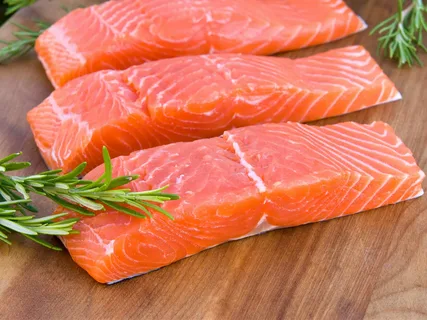Introduction to Salmon
Salmon is a species of fish found primarily in the North Atlantic and Pacific Oceans. It’s prized for its rich flavor and versatility in cooking. Salmon is known for its distinctive pink flesh, which is high in healthy omega-3 fatty acids and protein.
Nutritional Profile of Salmon
Salmon is a nutrient-dense food, packed with essential vitamins, minerals, and healthy fats. Here’s a breakdown of its nutritional content per 100 grams:
- Calories: 208
- Protein: 24 grams
- Fat: 14 grams (mostly healthy unsaturated fats)
- Omega-3 Fatty Acids: 2 grams
- Vitamin D: 15 micrograms (63% of the recommended daily intake)
- Vitamin B12: 8 micrograms (80% of the recommended daily intake)
- Selenium: 28 micrograms (50% of the recommended daily intake)
Salmon also contains niacin, phosphorus, and potassium.
Health Benefits of Salmon
Incorporating salmon into your diet offers numerous health benefits, including:
Heart Health
The omega-3 fatty acids in salmon help reduce inflammation, lower blood pressure, and decrease the risk of heart disease.
Brain Health
Omega-3s are essential for brain function and may improve cognitive function and reduce the risk of neurodegenerative diseases.
Eye Health
The omega-3 fatty acids EPA and DHA support eye health and may help prevent age-related macular degeneration.
Weight Management
Salmon is high in protein, which promotes feelings of fullness and aids in weight management.
Bone Health
Salmon is a good source of vitamin D, important for calcium absorption and bone health.
Types of Salmon
There are several species of salmon, each with its own unique flavor and texture. Common types of salmon include:
- Atlantic Salmon
- Pacific Salmon (e.g., Chinook, Sockeye, Coho)
- Pink Salmon
- Chum Salmon
Cooking Tips and Recipes
Salmon can be prepared in various ways to suit different tastes and preferences. Here are some popular cooking methods and recipes:
- Grilled Salmon with Lemon and Dill
- Baked Salmon with Garlic and Herbs
- Pan-Seared Salmon with Maple Glaze
- Smoked Salmon and Avocado Salad
Experiment with different seasonings and cooking techniques to find your favorite way to enjoy salmon.
Sustainability and Environmental Impact
As with any seafood, it’s essential to consider the sustainability and environmental impact of salmon fishing and farming. Look for sustainably sourced salmon from reputable suppliers and organizations that prioritize responsible fishing practices and environmental stewardship.
Frequently Asked Questions (FAQs)
Is wild-caught salmon better than farmed salmon?
Both wild-caught and farmed salmon can be nutritious options. However, wild-caught salmon tends to have higher levels of omega-3 fatty acids and lower levels of contaminants.
Can I eat salmon if I’m pregnant?
Yes, salmon is a nutritious choice for pregnant women due to its high omega-3 content, which is important for fetal brain development. However, pregnant women should choose low-mercury fish and cook it thoroughly to reduce the risk of foodborne illness.
How often should I eat salmon?
The American Heart Association recommends consuming fatty fish like salmon at least twice a week to reap the health benefits of omega-3 fatty acids.
Are there any potential risks associated with eating salmon?
While salmon is generally safe to eat, individuals with fish allergies should avoid it. Additionally, consuming large amounts of fish, including salmon, may expose you to environmental contaminants like mercury. Pregnant women and young children should be cautious about their fish intake.
Can I freeze salmon?
Yes, you can freeze salmon for up to three months. Make sure to wrap it tightly to prevent freezer burn and thaw it in the refrigerator before cooking.
Is smoked salmon as healthy as fresh salmon?
Smoked salmon is typically higher in sodium and may contain added preservatives, so it’s best enjoyed in moderation. However, it still retains many of the nutritional benefits of fresh salmon.
- Fish Oil Dosage: How Much Should You Take per Day? - May 1, 2024
- 10 Fantastic Keto Recipes - May 1, 2024
- Salmon: Nutrition, Health Benefits, and More - April 25, 2024



